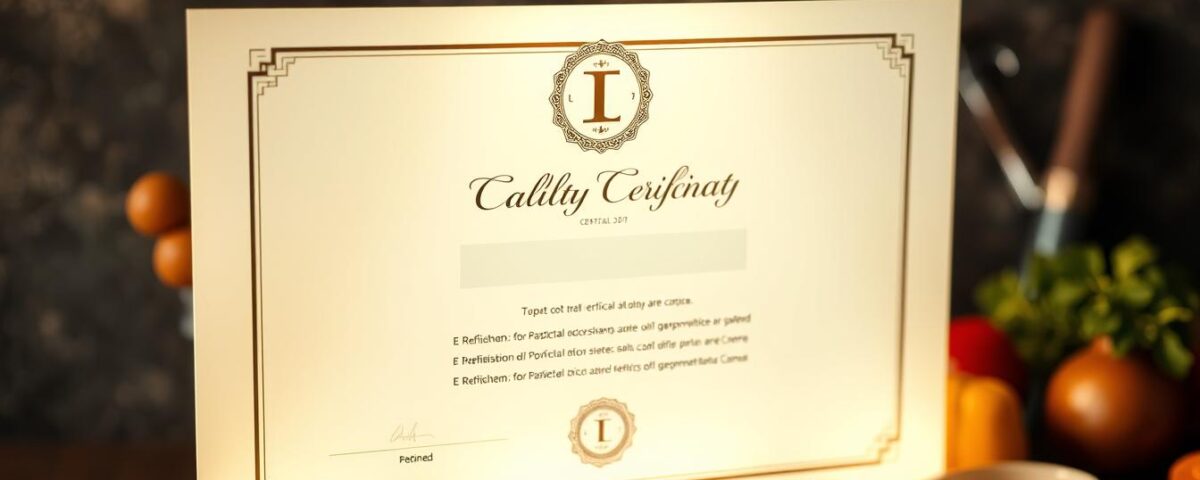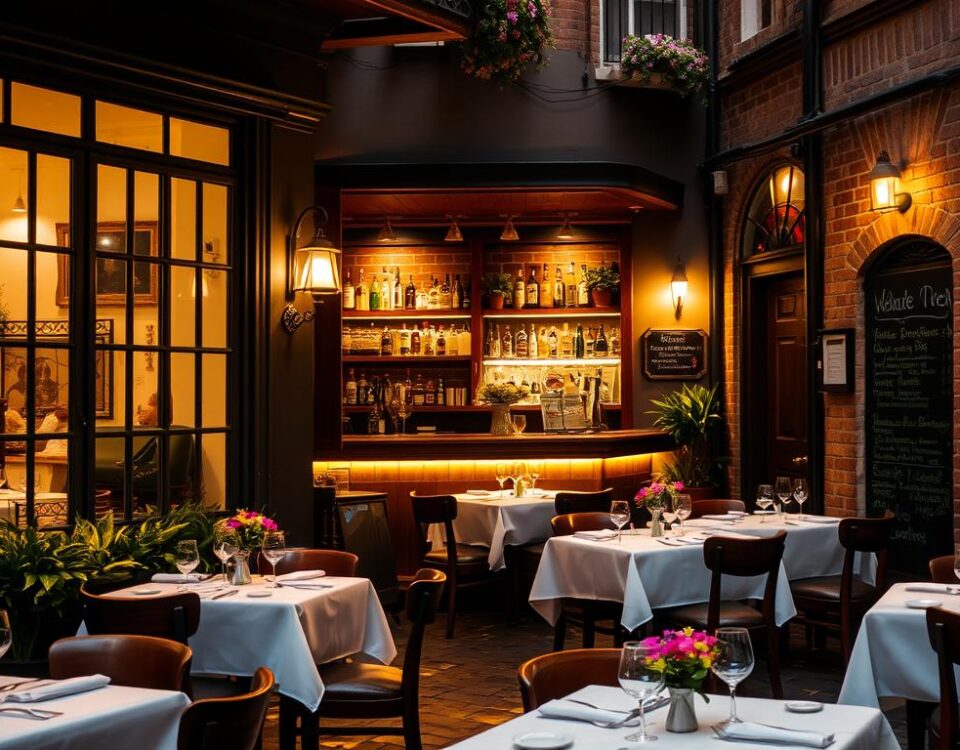
Culinary School vs Apprenticeship: Which Path Builds a Better Chef Career?
June 27, 2025
How to Start a Catering Business from Scratch and Succeed in 2025
June 28, 2025As a culinary professional, I’ve seen firsthand how certification can elevate a career. With the culinary landscape becoming increasingly competitive, having the right credentials can make all the difference. Did you know that a certification in culinary arts can increase job prospects and salary potential?
For over 25 years, our culinary education courses have helped thousands earn professional credentials. Our self-paced online courses provide the knowledge needed to succeed in the industry. What will you learn from the top certification courses that can boost your credibility?
Key Takeaways
- Types of culinary certifications available
- Benefits of obtaining a certification
- Application processes for top certification courses
- How certification can enhance your culinary career
- Accessibility of online certification courses
Why Chef Certification Matters in Today’s Culinary Landscape
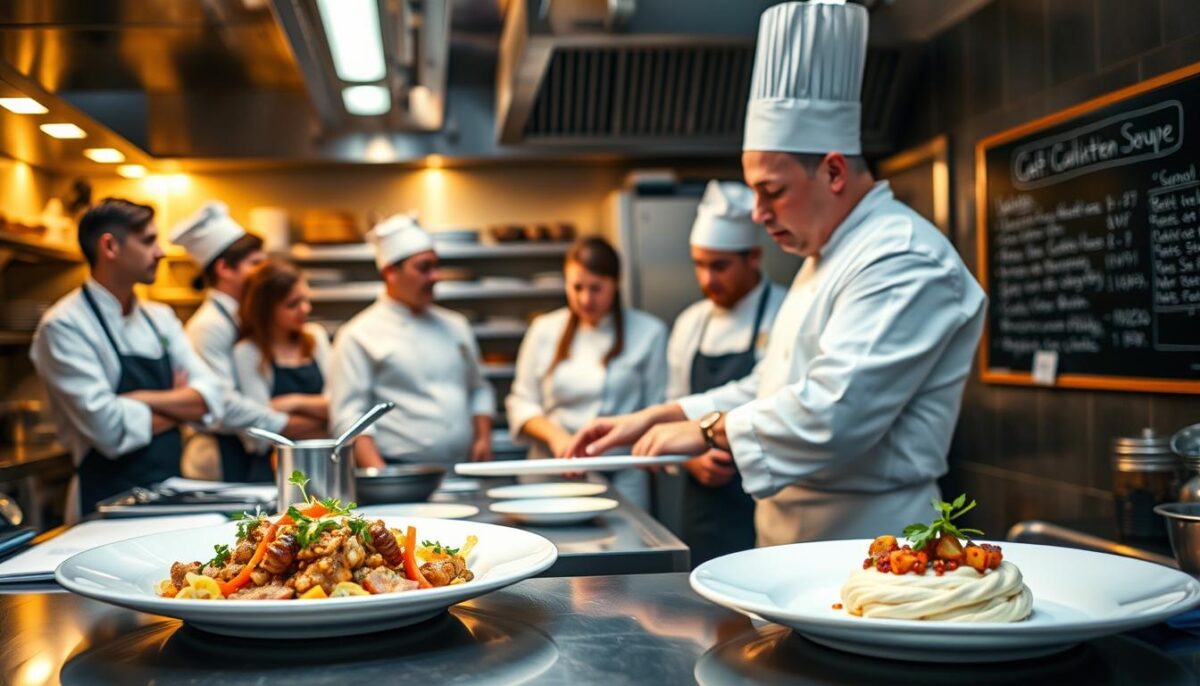
Certification matters now more than ever in the culinary arts. The culinary industry has evolved significantly, placing greater emphasis on formal credentials and certification. This shift is driven by the need for a benchmark for skills and knowledge in an increasingly competitive job market.
The American Culinary Federation’s (ACF) certification program is recognized throughout the industry as the standard for excellence in professional skills and knowledge. It offers “stackable credentials” that allow culinary professionals to build their expertise level by level.
Certified chefs often have greater career mobility and are taken more seriously by employers across the world. By obtaining certification, culinary professionals can elevate their standing in the culinary arts profession as a whole.
My Journey: How Chef Certification Courses Transformed My Career
As I reflect on my culinary journey, I realize that obtaining chef certification was a pivotal moment in my career. I was a passionate cook without formal certification, facing limitations in my early career. I decided to pursue certification through specific courses to advance.
Balancing work and learning as a student was challenging, but it transformed my approach to cooking. Certification opened doors to new opportunities in the culinary arts. My technical skills and confidence in the kitchen improved significantly.
| Skill | Before Certification | After Certification |
|---|---|---|
| Culinary Techniques | Limited knowledge | Advanced techniques |
| Kitchen Management | Basic understanding | Strategic planning |
| Creativity | Conventional recipes | Innovative dishes |
Certification helped me stand out when applying for competitive positions. The investment in my education has paid off multiple times over in career advancement and earning potential.
The Most Prestigious Chef Certification Courses Available
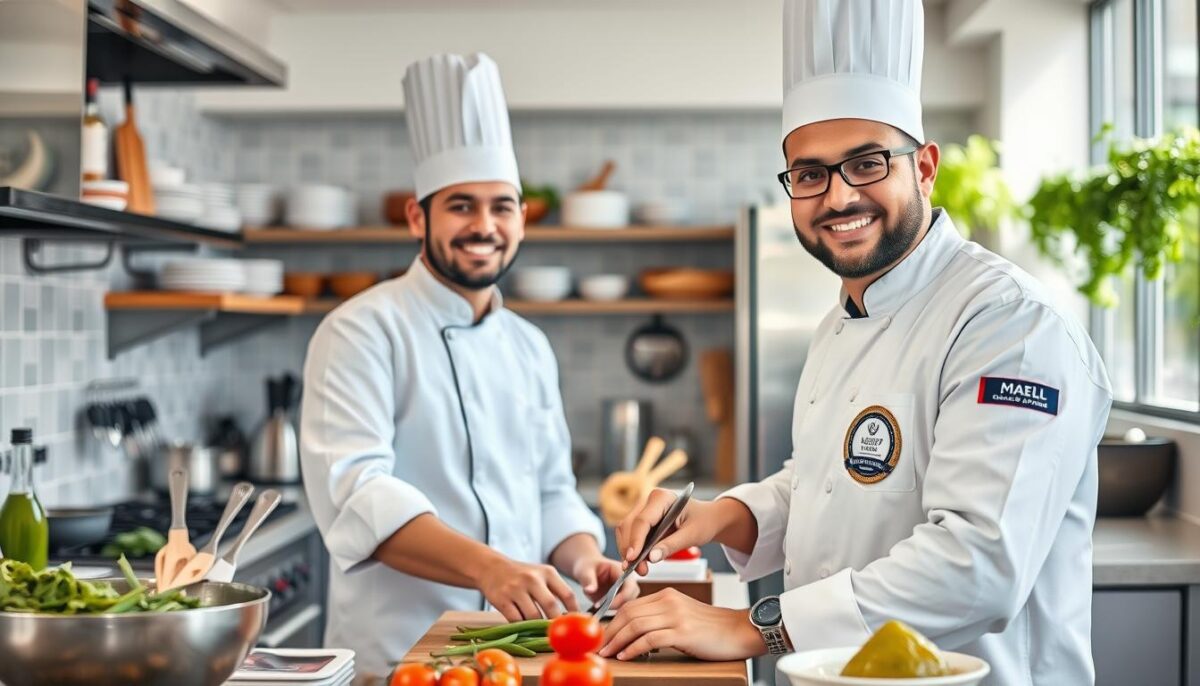
In the competitive culinary industry, having a renowned certification can make all the difference. The most prestigious chef certification programs are designed to validate a chef’s skills and knowledge, providing a competitive edge in the job market.
American Culinary Federation (ACF) Certifications
The ACF is the premier certifying body for chefs in America, offering 13 certification levels that cater to a variety of culinary professionals. From entry-level to master chef, these certifications are highly regarded in the industry.
Certified Executive Chef (CEC) Program
The CEC program is a prestigious certification that requires rigorous education, experience, and examination. It’s considered a gold standard for executive chefs, demonstrating their expertise and commitment to the profession.
Other Notable Certification Programs
Other notable programs include the Culinary Institute of America’s ProChef Certification and the International Association of Culinary Professionals certifications. These programs offer specialized credentials that can enhance a chef’s career prospects.
By obtaining these prestigious certifications, chefs can significantly boost their credentials, opening up new career opportunities and increasing their earning potential. Whether you’re just starting out or looking to advance your career, these certification courses can help you achieve your goals.
Key Benefits of Becoming a Certified Culinary Professional
As a culinary professional, becoming certified can be a crucial step in advancing my career and increasing my earning potential. The American Culinary Federation (ACF) Certification program offers 13 certification levels, making a chef a more valuable candidate for hiring and promotion.
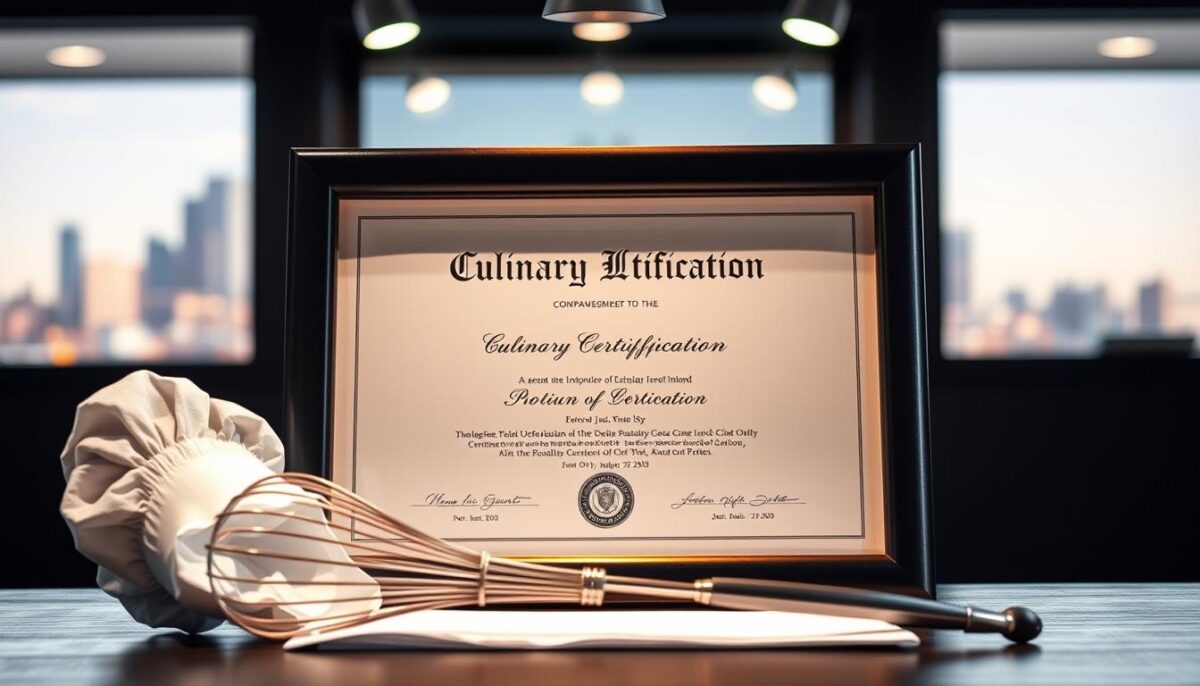
Increased Earning Potential
Certification can significantly boost my salary, with certified chefs earning 10-15% more on average than their non-certified counterparts. This increase in earning potential is a direct result of the enhanced skills and knowledge gained through the certification process.
Enhanced Professional Recognition
By obtaining certification, I demonstrate my commitment to the culinary arts and gain recognition among my peers and employers. This professional recognition can lead to increased respect and credibility in the industry.
Expanded Career Opportunities
Certification opens doors to new career opportunities, qualifying me for positions that specifically require certification. With the ACF Certification program, I can advance my career and explore new roles in the culinary industry, such as teaching and mentoring the next generation of culinary professionals.
Essential Chef Certification Courses for Career Advancement
Career advancement in the culinary industry often starts with the right certification. For over 25 years, our culinary education courses have helped thousands of students earn professional culinary credentials.
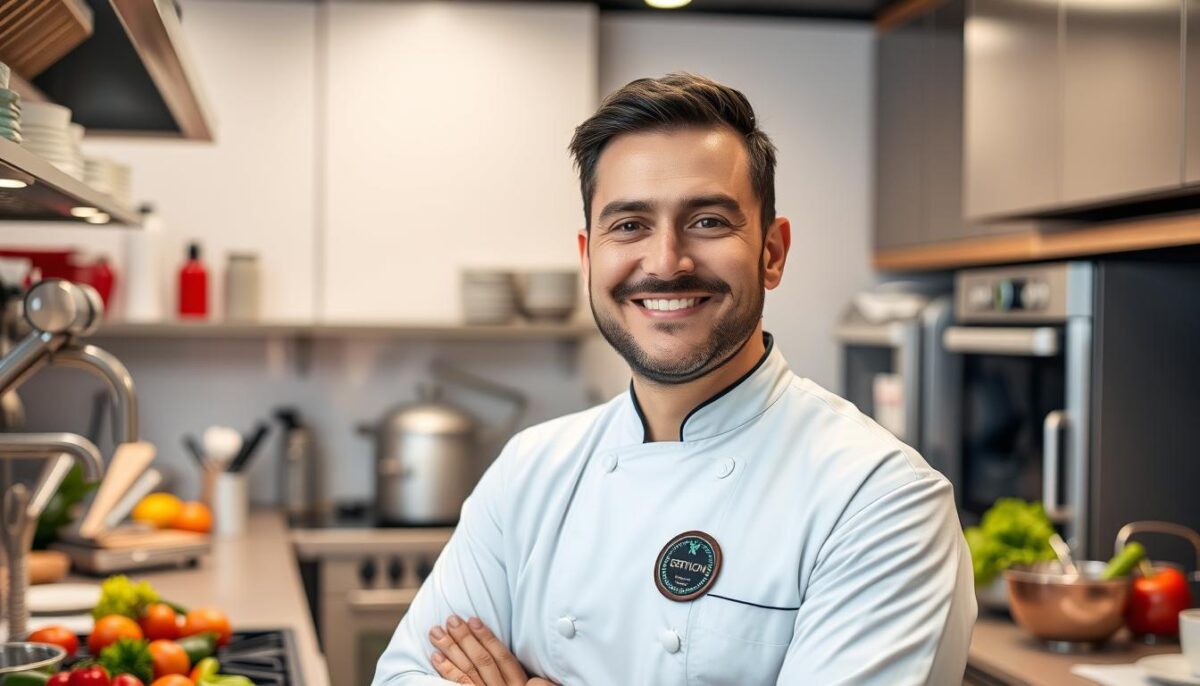
Fundamentals of Professional Cooking Certificate
This certificate establishes essential cooking techniques and knowledge needed for any culinary career. It covers the basics of cooking, kitchen management, and food safety.
Food Safety Manager Certification
This certification is often a legal requirement for kitchen managers in many states. It ensures that managers understand food safety protocols to prevent foodborne illnesses.
Specialized Culinary Certifications
These certifications focus on specific cuisines or techniques, such as pastry arts, plant-based cooking, or international cuisines. They help chefs diversify their skills and stay competitive.
These essential certifications build upon each other to create a well-rounded culinary professional. They help students develop both technical skills and theoretical knowledge necessary for advancement.
Education Requirements and Work Experience Needed
To become a certified culinary professional, one must meet specific education and work experience prerequisites. The requirements are designed to ensure that candidates have both the theoretical knowledge and practical skills necessary for success in the culinary industry.
Mandatory Course Requirements
The certification program mandates completion of specialized courses that cover various aspects of culinary management. These include:
- A 30-hour course in Nutrition, focusing on dietary needs and meal planning.
- A 30-hour course in Food Safety & Sanitation, emphasizing safe food handling practices.
- A 30-hour course in Supervisory Management, covering leadership and staff management.
- A 30-hour course in Beverage Management, exploring wine, spirits, and beverage service.
- A 30-hour course in Cost Control Management, focusing on inventory management and cost optimization.
Experience Prerequisites
Candidates must have at least five years of experience as a chef de cuisine, executive sous chef, or in charge of food production in a foodservice operation within the past ten years. This experience should include supervising at least five full-time staff members in food preparation.
The educational background required can be fulfilled through various paths, including a High School Diploma/GED with 150 Continuing Education Hours (CEH), 250 CEH, an Associate’s Degree in Culinary Arts, or completion of an ACFEF Apprenticeship Program. These education and hours requirements ensure that candidates are well-prepared for the demands of the culinary profession.
https://www.youtube.com/watch?v=BTYiHeitWE0
For those who may not yet meet all the requirements, there are options to work towards certification. This includes accumulating the necessary hours of continuing education through various courses and professional development activities, as well as gaining relevant management experience in foodservice operations.
The Certification Process: From Application to Examination
Embarking on the certification journey requires a thorough understanding of the application process. To become a certified culinary professional, one must navigate through several steps, from initial application to final certification.
Initial Application Steps
The first step involves submitting an initial application with proof of education, completion of 30-hour courses, and work experience. Employment verification can be submitted on the Employment Documentation Form or employer letterhead. It’s essential to allow 2-3 weeks for processing applications.

Written and Practical Exam Preparation
Upon receiving approval for the initial application, candidates are eligible to schedule their written and practical exams. The written exam includes questions on various culinary topics, and candidates must prepare answers that demonstrate their knowledge. The practical exam requires demonstrating specific cooking methods and techniques under observation, showcasing one’s skill and expertise.
Final Application and Certification
After successfully completing both exams, candidates must submit their final application with exam pass sheets and the application fee. It’s crucial to allow 2-3 weeks for processing. Upon approval, the certificate will be mailed, marking the completion of the certification program.
Maintaining Your Culinary Credentials Through Continuing Education
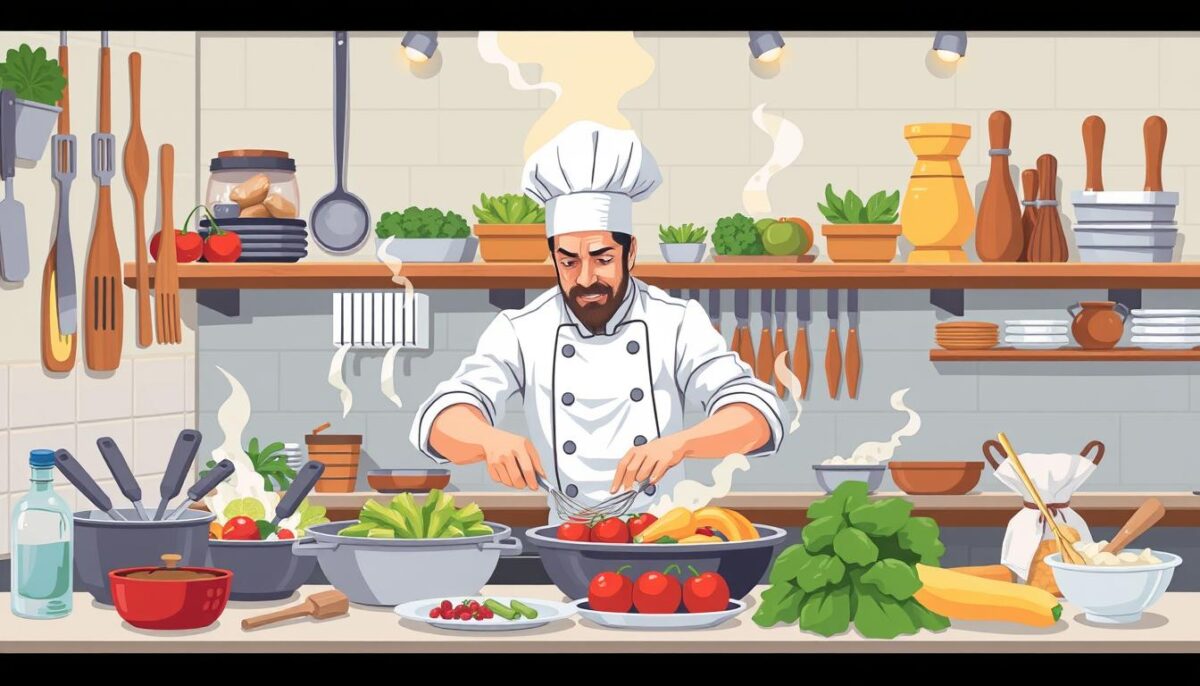
Certified culinary professionals must complete continuing education requirements to maintain their credentials and stay relevant in the industry. The Certified Executive Chef (CEC) Certification, for instance, requires renewal every five years. To recertify, chefs can complete continuing education courses through ACF-approved providers or academic institutions.
These courses help students stay current with evolving food trends, techniques, and industry standards. Continuing education options include workshops, conferences, and online learning opportunities, allowing certified chefs to expand their expertise into new culinary areas. For example, a course in food safety management or a specialized culinary certification can enhance a chef’s skills and knowledge.
To plan ahead, certified professionals should be aware of the recertification process, including documentation and submission requirements. By staying informed and committed to ongoing continuing education, culinary experts can maintain their certification and continue to excel in their careers.
Conclusion: Investing in My Culinary Future Through Certification
Through certification, I’ve gained a deeper understanding of various cuisines and cooking methods. This recognized credential has not only validated my cooking skills but also enhanced my career prospects. I encourage you to assess your own career goals and consider the right certification path for you. Investing in your culinary education is a step toward a brighter future in the culinary world.
By becoming certified, you’ll connect with a wider community of professional chefs and open doors to new opportunities. Certification is an ongoing journey, not a one-time achievement. Take the first step toward advancing your career and investing in your culinary future today.
FAQ
What are the benefits of obtaining a culinary certification?
Obtaining a culinary certification can increase my earning potential, enhance my professional recognition, and expand my career opportunities in the culinary industry.
What are the education requirements for culinary certification?
The education requirements for culinary certification vary depending on the program, but most require a certain number of hours of culinary arts training or equivalent work experience.
How do I prepare for the certification exam?
To prepare for the certification exam, I can take mandatory course requirements, study relevant materials, and gain practical experience in the kitchen to master various cooking methods and techniques.
What is the difference between various culinary certifications?
Different culinary certifications, such as those offered by the American Culinary Federation (ACF), have varying levels of difficulty and specialization, and are designed to validate different aspects of my culinary skills and knowledge.
How can I maintain my culinary certification?
To maintain my culinary certification, I need to complete continuing education requirements, which may include attending workshops, seminars, or online continuing education programs to stay up-to-date with the latest culinary education trends and techniques.
Will culinary certification guarantee me a job in the industry?
While culinary certification can certainly enhance my job prospects, it is not a guarantee of employment; however, it can give me a competitive edge in the job market and open up more career opportunities.
Can I pursue specialized culinary certifications?
Yes, I can pursue specialized culinary certifications in areas like baking, food safety management, or specific cuisines, which can help me develop expertise and stand out in a particular area of the culinary industry.
